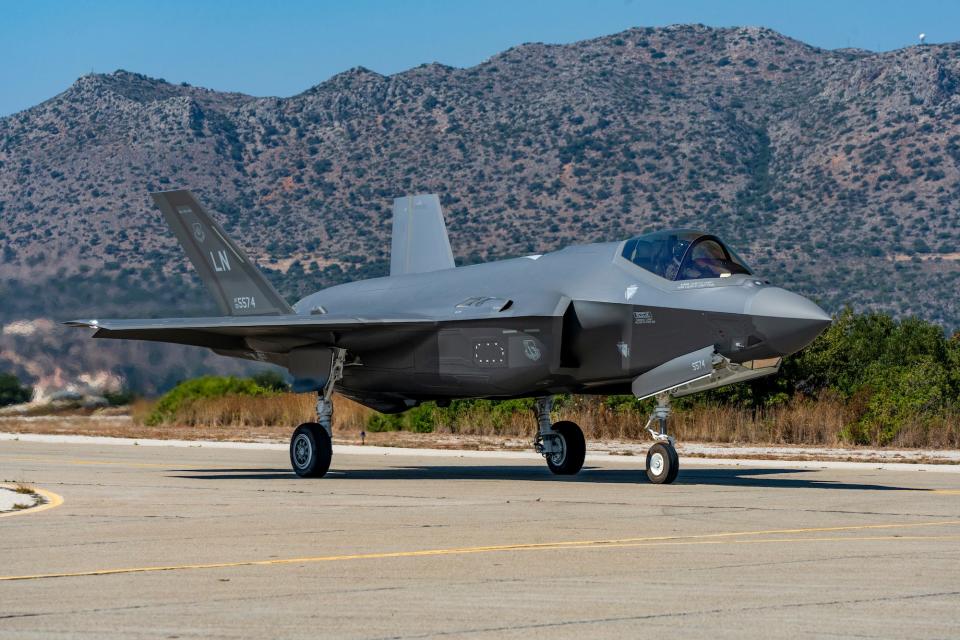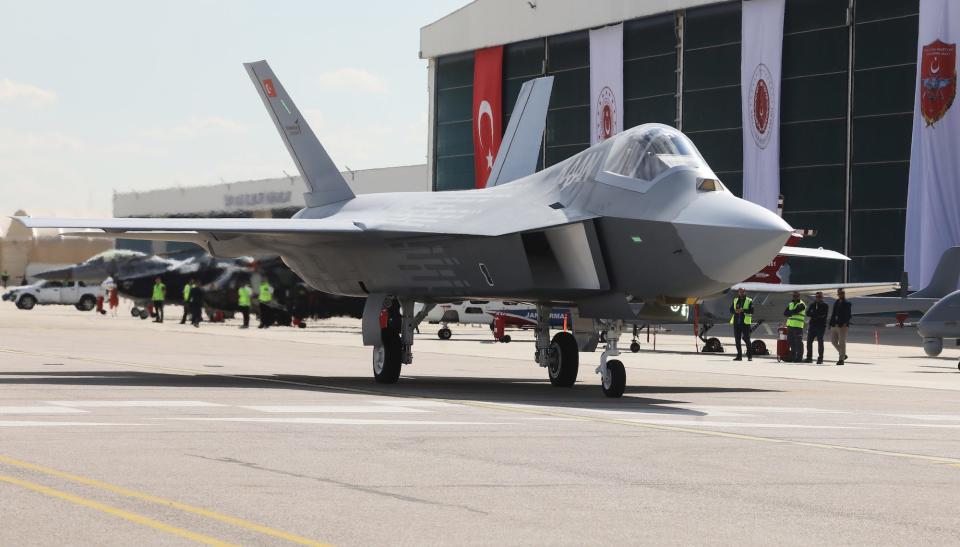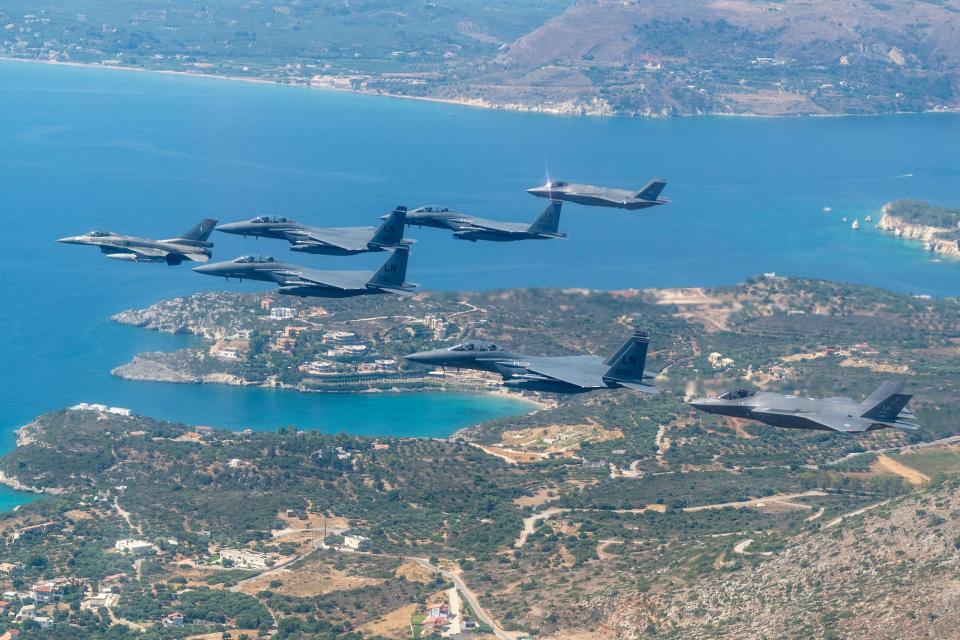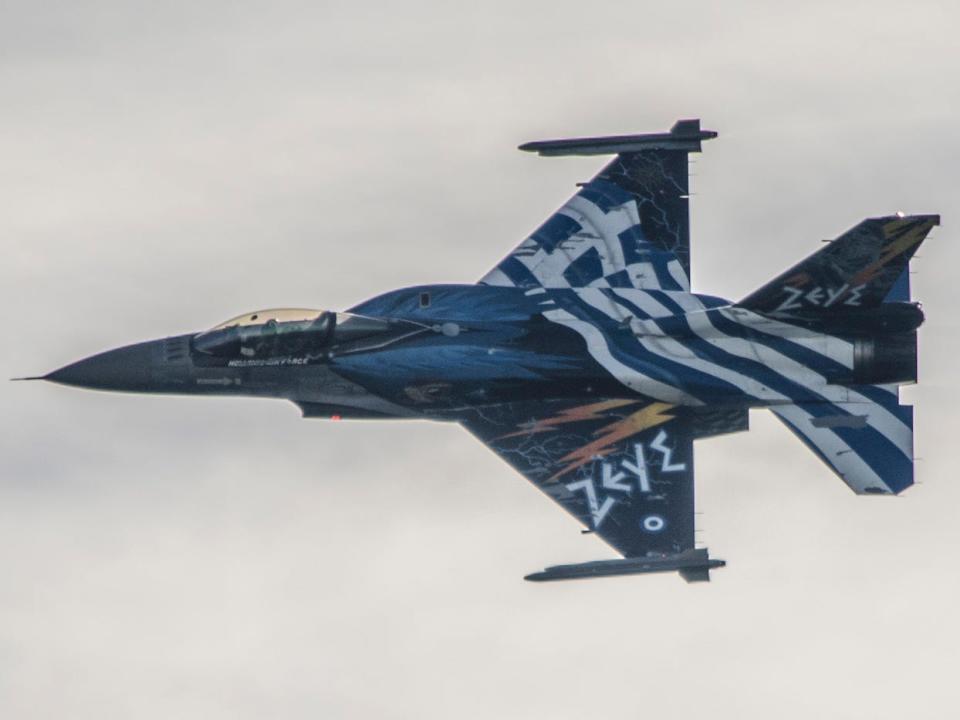NATO's 2 least-friendly members have a history of aerial showdowns, and they're both about to get new stealth jets
Greece and Turkey both plan to roll out new stealth jets by the end of the decade.
Greece is acquiring F-35s from the US, while Turkey is building the domestically designed TF Kaan.
Both countries are NATO members, but their tense relations have raised concerns within the alliance.
Greece and Turkey both expect to begin fielding new stealth fighter jets as early as 2028. Greece is acquiring US-designed F-35s, while Turkey is building the indigenously developed TF Kaan.
The countries are both NATO members, but they also have longstanding political and territorial disputes, and their competing claims in the Aegean Sea have led to tense standoffs between their militaries — showdowns that have raised fears of an intra-alliance war.
If both sides are operating stealth fighters by the next decade, it could change the nature of the mock dogfights that their air forces periodically engage in over the Aegean.
Not all stealth is created equal

Athens expects to begin receiving the first of at least 20 F-35A jets between 2028 and 2033, according to Greek media.
Ankara — banned from buying F-35s over its purchase of Russia's S-400 air-defense system — expects to begin fielding its TF Kaan in a comparable timeframe. Turkish Aerospace Industries says it can deliver the first 20 jets in 2028.
While both designated as stealth aircraft, the jets are likely to have different capabilities, and since the TF Kaan isn't operational yet, it's hard to say how they would stack up in an engagement.
"It's not entirely clear how well the TF Kaan will perform on a stealth level, but one thing is currently known: It will be using an older and less powerful engine than the F-35, the GE F110, as opposed to the F-35's Pratt and Whitney F135," Ryan Bohl, a senior Middle East and North Africa analyst at the risk-intelligence company RANE, told Insider.

Relying on the GE F110, which is better known for its use in the F-16 and other older US jets, will leave the TF Kaan at a disadvantage against future Greek F-35s. Bohl said the jet will most likely "serve as a slow replacement" for Turkey's large F-16 fleet rather than as a counterweight to Greece's F-35.
This suggests that even if Turkish Aerospace Industries meets its ambitious rollout date, the TF Kaan still won't deny Greece a technological edge over Turkey's larger air force.
George Tzogopoulos, a senior fellow at the Centre International de Formation Européenne, a French policy research institute, believes Greece's timeframe for receiving F-35s is more realistic than Turkey's for the TF Kaan since the latter "depends on several unknown parameters."
"The Turkish defense industry has already made progress (e.g., Bayraktar TB2 drones), but the completion and production of fifth-generation jets is a completely different and new mission," Tzogopoulos told Insider.

"For now, only Azerbaijan is partnering with Turkey, while rumors exist about Pakistan," Tzogopoulos said. "Without undermining Turkish national ambitions in this sector, some cautiousness is required."
Bohl said several factors could hinder timely production of the TF Kaan, including fiscal considerations, national spending priorities, and Ankara's foreign partnerships.
Those partnerships "might offset" the fiscal strain of developing the jet, but that would require Turkey to maintain good relations with key partners, such as the UK since BAE Systems is an important partner in the project.
"Other countries that have shown interest in the TF Kaan, like Azerbaijan, might also offset this fiscal strain, but again, that will depend on relations and Baku's own spending priorities" as well as on energy prices, Bohl said.
Stealth jets over the Aegean

While introducing stealth fighters could add a new dimension to the mock dogfights over the Aegean, both analysts said the situation is already dangerous without them.
In those dogfights, "there always is a risk of miscalculation caused by pilot error," Bohl said, "though I strongly suspect that even with stealth capabilities at play, both Athens and Ankara would be strongly incentivized to develop protocols to avoid accidental shoot-downs and military incidents."
Nevertheless, if either side gains new stealth capabilities, they might become more emboldened to violate the other's airspace, "riling diplomatic relations," Bohl added.

Bohl also said that were Turkey to activate its S-400s — the very systems that got Ankara banned from buying F-35s in the first place — within range of the Aegean and potentially of Greek F-35s, it could affect US-Greek relations, "given the US is highly concerned about that system learning to target F-35s and that information making its way into Russian hands."
Tzogopoulos said the situation in the Aegean will depend on the outcome of the countries' ongoing negotiations to de-escalate the situation. If those talks fail to produce an agreement over their lingering Aegean dispute, tensions are bound to resurface.
"The risk of accidents in the air (but also in the sea) will be high even before the expected fielding of stealth fighters," Tzogopoulos said. "It is not a matter of the type of fighter, but of the political will to prevent crises."
Paul Iddon is a freelance journalist and columnist who writes about Middle East developments, military affairs, politics, and history. His articles have appeared in a variety of publications focused on the region.
Read the original article on Business Insider

 Yahoo News
Yahoo News 
